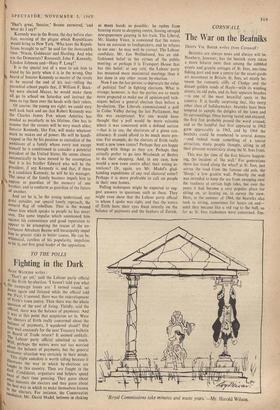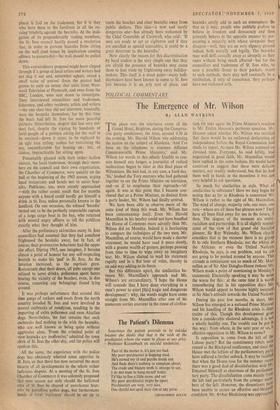CORNWALL
The War on the Beatniks
DENYS VAL BAKER writes from Cornwall:
Beatniks are always news and always will be. Nowhere, however, has the beatnik story taken a more bizarre twist than among the cobbled streets and granite cottages of St. Ives, one-time fishing port and now a centre for the avant-garde art movement in Britain. St. Ives, set neatly be- tween the romantic cliffs of Clodgy and the distant golden sands of Hayle—with its winding streets, its old pubs, and its four separate beaches — is one of the most beautiful spots in the country. It is hardly surprising that, like every other class of holidaymaker, beatniks have been tempted to sample the delights of the town and its surroundings. Once having tasted and enjoyed, the first few probably passed the word around, and so the handful that first appeared in 1962 grew appreciably in 1963, and by 1964 the beatniks could be numbered in several dozens — and indeed made something of a tourist attraction, many people thought, sitting in all their pleasant eccentricity along the St. Ives front.
This was the time of the first bizarre happen- ing, the incident of 'the wall.' For generations there has stood along the wharf at St. Ives, just across the road from the famous old pub, the 'Sloop,' a low granite wall. Primarily the wall was intended to keep the sea from sweeping over the roadway at certain high tides, but over the years it had become a very popular place for sitting on, or leaning on, to survey the view. Here, in the summer of 1964, the beatniks also took to sitting, sometimes for hours on end— until they became like a red rag to the bull, so far as St. Ives tradesmen were concerned. Em-
'Royal Commissions take minutes and waste years.'—Mr. Harold Wilson.
phasis is laid on the tradesmen; for it is they who have been to the forefront in all the en- suing Vehdetta against the beatniks. At the insti- gation of its preponderantly trading members, the St. Ives council hastily passed a resolution that, in order to prevent beatniks from sitting on the wall (and hence by implication causing offence to passers-by)--the wall should be pulled down.
This extraordinary proposal might have slipped through if a group of local artists and writers had not dug it out and, somewhat aghast, raised a small voice of protest. Soon the protest had grown to such an extent that units from West- ward Television at Plymouth, and even from the BBC, London, were sent down to investigate. They interviewed councillors and tradesmen, fishermen, and other residents, artists and writers —the one class they did not interview, ironically, were the beatniks themselves, for by this time the beats had left St. Ives for more peaceful pastures. Nevertheless, despite this last very evi- dent fact, despite the signing by hundreds of local people of a petition asking for the wall to be retained—down it came, to be replaced by an ugly iron railing, useless for restraining the sea, uncomfortable for leaning on: but, of course, impracticable for sitting upon.
Presumably pleased with their rather hollow victory, the local tradesmen, through their mem- bers on the council and their own organisation, the Chamber of Commerce, were quickly on the ,ball at the beginning of the 1965 season, urging local restaurants and hotels not to serve beat- niks. Publicans, too, were sternly approached —with the rather comic result that for months anyone with a beard could hardly get himself a drink in St. Ives, unless personally known to the landlord. On one occasion, the refused 'beardie' turned out to be the perfectly respectable captain of a large cargo boat in the bay, who returned with several angry officers to tell the publican exactly what they thought of him.
After the preliminary skirmishes many St. Ives councillors had assumed that they had somehow frightened the beatniks away, but in fact, of course, their provocative behaviour had the oppo- site effect. During 1965, one imagines, it became almost a point of honour for any self-respecting beatnik to make his 'pad' in St. Ives. As the invasion increased, so the reprisals grew. Restaurants shut their doors, all pubs except one refused to serve drinks, policemen spent hours touring the vicinity of the beaches, even, in due course, removing any belongings found lying around.
It was perhaps unfortunate that around this time gangs of rockers and mods from the north country invaded St. Ives and were involved in several outbreaks of rowdyism, resulting in the importing of extra policemen and even Alsatian dogs. Nevertheless, the fact remains that such outbreaks had nothing to do with the beatniks, who are well known as being quite without aggressive aims. 'From the criminal point of view beatniks are inoffensive,' admitted the town clerk of St. Ives the other day, and the police will confirm this.
All the same, the experience with the police dogs has obviously whetted some appetites in St. Ives, so that there has now occurred the most bizarre of all developments in the whole rather ludicrous dispute. At a meeting of the St. Ives Chamber of Commerce it was solemnly proposed that next season not only should the hallowed area of St. Ives be cleared of unwelcome beat- niks by patrolling police dogs, but furthermore bands of local 'vigilantes' should be set up to
roam the beaches and clear beatniks away from public shelters. This idea—a new and surely dangerous one—has already been welcomed by the Chief Constable of Cornwall, who said: 'If men are ready to act as vigilantes and if they arc enrolled as special constables, it could be a great deterrent to the beatniks.'
Now clearly the reason for this discrimination by local traders is the very simple one that they are afraid the presence of beatniks may cause them to lose trade by frightening away holiday- makers. This itself is a moot point—many holi- daymakers have been known to come to St. Ives just because it is an arty sort of place, and
beatniks surely add to such an atmosphere. Be that as it may, people who publicly profess to believe in freedom and democracy and then privately behave in the opposite manner by per- secuting a minority with whose viewpoint they disagree—well, they are on very slippery ground indeed, both morally and legally. The beatniks may well drift casually away as abruptly as they came without being much affected—but for the councillors and tradesmen of St. Ives who, to save a possible threat to their pockets, resort to such methods, there may well eventually be a retribution, if only of conscience, they perhaps have not reckoned with.







































 Previous page
Previous page